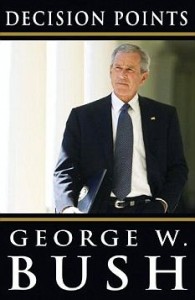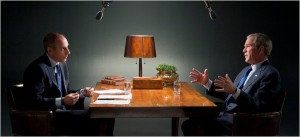In this age of Twitter and Facebook, no detail about the life of any celebrity, let alone the president of the United States, is too small or irrelevant to publish. Hell, even the Queen of England has become a twittering narcissist who launched her own Facebook page just today – presumably to compete with the likes of Lady Gaga in either flaunting or trading on their celebrity.
This is why presidential memoirs can be little more these days than a regurgitation of what has already been churned through the 24/7 news and gossip mill. For example, famed reporter Bob Woodward of the Washington Post has already written such detailed articles (and even a book) on Obama’s presidency that one could be forgiven the impression that he has been sitting on the president’s left shoulder since day one.
More to the point, Woodward wrote similar articles (and no less than four books) on Bush’s presidency before George W. left the White House. Which is why we hardly needed this memoir to learn that former VP Dick Cheney served as an Iago who goaded Bush into taking out Saddam Hussein as a means to avenge his father and prove his manhood. (For your edification, Bush writes that Cheney inquired indignantly during lunch one day, “Are you going to take care of this guy, or not?”)
Yet somehow this former president has managed to publish a memoir that is generating a lot of buzz for what appears to be a refreshing take on his presidency. And nothing demonstrates this quite like the (initial) impression it made on his most celebrated critic, Maureen Dowd of the New York Times:
In his deftly crafted and utterly selective new memoir, W. is the president we all wished him to be: compassionate, bipartisan, funny, charming, instinctive, independent, able to admit and learn from mistakes – and a good dad, who sang his twin girls the Yale fight song as a lullaby.
Heck, after I finished reading it, I was ready to vote for the guy…
But when I look at the sad eyes of President Obama, buried alive with his party beneath the heedless decisions and reckless spending and tax cuts of his predecessor, I snap out of it.
(NY Times, November 11, 2010)
 Notwithstanding Dowd’s patented sarcasm, she affirms my view that for a presidential memoir to be interesting and engaging it would have to be comprised of revisionist history drafted while wearing rose-colored glasses and suffering an acute case of selective amnesia. In this sense, Bush’s Decision Points, is a literary tour de force.
Notwithstanding Dowd’s patented sarcasm, she affirms my view that for a presidential memoir to be interesting and engaging it would have to be comprised of revisionist history drafted while wearing rose-colored glasses and suffering an acute case of selective amnesia. In this sense, Bush’s Decision Points, is a literary tour de force.
To be fair, though, he does reveal a few things about his character that are truly noteworthy. And, apropos of selective amnesia, Dowd was clearly remiss in ignoring them in her snarky review, choosing instead to regurgitate churned up quips about 9/11, WMDs and Katrina.
For example, rapper Kanye West came across like a turrets sufferer when he suddenly blurted out the following during a telethon for Katrina relief:
George Bush doesn’t care about black people.
(NBC, September 2, 2005)
Therefore, it speaks volumes about Bush’s racial sensitivity that he dignified Kanye’s outburst by writing the following about it in his memoir:
Five years later I can barely write those words without feeling disgust. I faced a lot of criticism as President. I didn’t like hearing people claim that I lied about Iraq’s weapons of mass destruction or cut taxes to benefit the rich. But the suggestion that I was racist because of the response to Katrina represented an all time low.
It’s an indication of how rabid and unrelenting his liberal critics are, however, that they are spewing indignation at Bush for making this understandably human admission. Never mind that their mob-like criticisms are premised on the plainly ideological inference that this admission proves Bush cared more about Kanye calling him a racist than he did about the thousands of troops who died in Iraq or the thousands of people who died in New Orleans (in Katrina’s wake).
Whereas, given the legacy of racism in America, Bush should be commended for feeling so strongly about being unfairly tagged with this epithet that he reiterated last week – during an interview on the TODAY Show with Matt Lauer to promote his memoir – that:
I didn’t appreciate it then. I don’t appreciate it now. It’s one thing to say, ‘I don’t appreciate the way he’s handled his business.’ It’s another thing to say, ‘This man’s a racist.’ I resent it, it’s not true, and it was one of the most disgusting moments in my presidency.
Then, of course, there’s the inconvenient truth that he has done more for the Dark Continent of Africa than any president in U.S. history, including Bill Clinton and Barack Obama … so far.
‘Actually, today I had to defend the Bush Administration in France again. They refuse to accept, because of their political ideology, that he has actually done more than any American President for Africa. But it’s empirically so.’
[I used this extraordinary defense by acclaimed humanitarian and rock star Bob Geldof to buttress my assertion that] even though liberals clearly begrudge the fact that Bush is not only Africa’s most generous patron but also its most reliable supporter, it behooves them to put up or shut up and just give the man his due!
(Bush has done more for Africa than any other president, The iPINIONS Journal, June 20, 2005)
So the take away from his memoir is that you can call George W. Bush a Daddy’s boy, a dunce, or even a warmonger; although, he might remind you that, if critics are to be believed, he shared the latter two traits with none other than former President Ronald Reagan. Just don’t call him a racist.
Think whatever you will of his policies, but this memoir acquits Bush in many respects as an essentially good and decent man. This Republican even makes a compelling case for why, if asked, he would have endorsed Obama, the Democrat, instead of McCain, his fellow Republican, to succeed him as president in 2008. And, as presidential memoirs go these days, this alone makes reading it worthwhile….
Related commentaries:
Bush has done more for Africa

Leave a Reply
You must be logged in to post a comment.